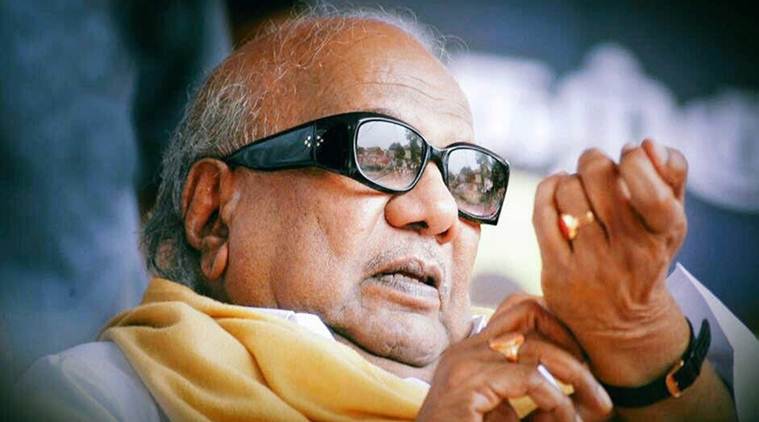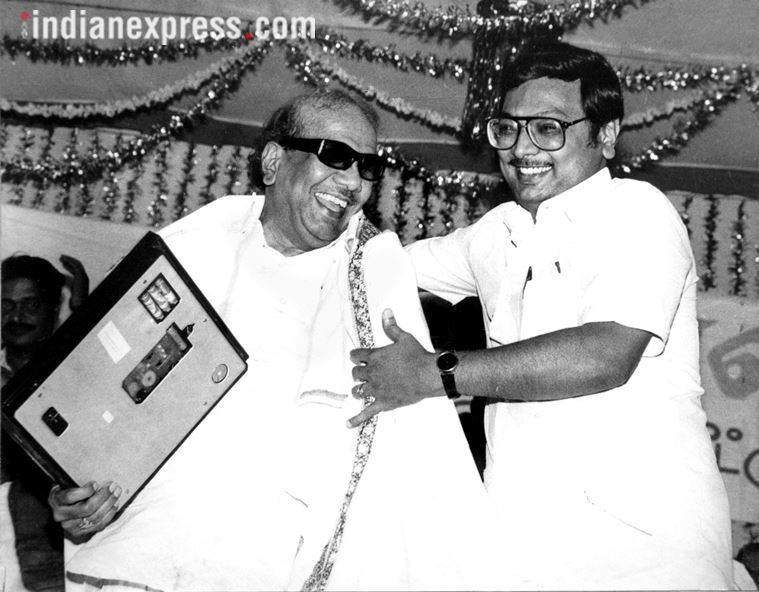 Karunanidhi. (File)
Karunanidhi. (File)
For a man with so many ups and downs in a decades-long political career, one of the biggest political setbacks for M Karunanidhi came early in his political life as Tamil Nadu chief minister, when M G Ramachandran, or MGR, left his party, the DMK, and floated AIADMK in 1972.
Even though there were rivalries in the party after the death of Karunanidhi’s political mentor and former chief minister C N Annadurai in 1969, it was MGR and his ally M Kalyanasundaram, a CPI leader, whose allegations of corruption against the DMK leader arguably did him the biggest harm — politically.
Not one corruption charge against Karunanidhi was proved in his lifetime.
In the four years since he formed AIADMK, MGR raised several allegations of corruption against the then chief minister. In 1976, the Karunanidhi government was dismissed by the Centre on the basis of multiple charges. A Supreme Court judge, Ranjit Singh Sarkaria, was appointed to probe into as many as 28 allegations of corruption, and ostensible misuse of power.
MGR won the Assembly election the following year, and remained chief minister for the next more than 12 years — until his death in December 1987.
Karunanidhi once used to jokingly say that his days comprised two manrams (courts) —“In the morning, I attend neethi manram (legal court), and in the evening, makkal manram (people’s court),” he would say.
When the DMK was labelled a corrupt party by rivals, it was the propaganda that punished him politically, said retired Madras High Court judge K Chandru. “The wheat scam and the Sarkaria Commission probe gave him (and the DMK) the ‘corrupt’ tag. This would also become a political game (successive) governments at the Centre used — to forge or break alliances, or dismiss or restore governments in Tamil Nadu,” Justice Chandru said.
The Sarkaria Commission’s charges, he said, were “dropped silently, when Karunanidhi struck an alliance with the Congress”.
 Karunanidhi with son Azhagiri
Karunanidhi with son Azhagiri
Another setback for Karunanidhi was the ouster of Vaiko, a close associate, from DMK in the early 1990s, during the last leg of the Sri Lankan war, in which he had clearly marked his position in favour of the Tamil Tigers. Close associates recall how embarrassed Karunanidhi, then the CM, was when he had to be a mute spectator as the slain LTTE leader’s ailing mother, Parvati, was deported from Chennai airport on her arrival from Malaysia.
“Shaken” at the news of Prabhakaran’s killing, Karunanidhi “skipped meals when news broke of the killing of Prabhakaran’s 12-year-old son later in 2013”.
While MGR’s exit from the party, and his emergence as a strong rival, put Karunanidhi out of power for over 13 years, it was also a personal tragedy for Karunanidhi at the death of his old friend.
When the news broke of MGR’s death in December 1987, Karunanidhi was on Tirunelveli Express, returning to Chennai.
Also read | M Karunanidhi: Democrat and patriarch
M Naganathan, a close friend and a former teacher of economics at Madras University recalled: “He got the news at Villupuram station, got off at Chengalpet (the next station), and travelled by road to MGR’s home to pay last respects. It was around 4 am, and MGR’s wife Janaki was expecting him —Karunanidhi had solemnised MGR and Janaki’s wedding. The next day, I saw him weeping while watching visuals of MGR’s funeral on Doordarshan.”
MGR’s successor J Jayalalithaa was also a strong adversary for the DMK leader. If their rivalry went to the extent that there were no photographs of the state’s two tallest politicians for close to three decades, Naganathan recalled that Karunanidhi never harboured personal vengeance against Jayalalithaa. “She was too junior to him — he had known her since her early life as a child artist in films. When the police (under a DMK government) arrested Jayalalithaa in 1996 on charges of amassing wealth disproportionate to income, she delayed the arrest by an hour and half, citing various reasons. Officers kept calling Karunanidhi for instructions. His only order for them was to wait until she emerges from home.”
Within five years, Karunanidhi was forcibly picked up by the police from his home in the early hour, and arrested. Jayalalithaa was the chief minister.